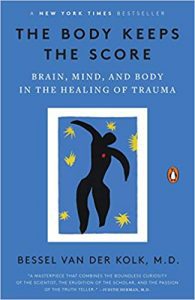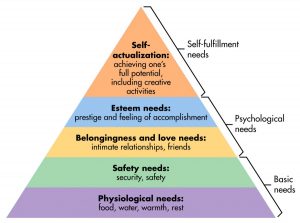Most of us love a good story. We have since we were young. We love to hear that the underdog wins or the good guy saves the day. This is partly because we are all living inside an epic story. The question is, do we know and understand our story in a way that we are living our story out, or is our story living us out?
We’ve covered a lot concerning mental health awareness and understanding how trauma presents itself in our lives over the past month. Maybe something you heard or read resonated with you in a way that, frankly, is a little scary, and you’re wondering what do I do with this. Please know you are not alone. We’ve all had those moments where even the idea of taking another breath seems too difficult. But you can and you will.
Some may think that trauma and healing don’t have much in common. Yet, just as a pebble thrown into a still body of water creates ripple after ripple, so do the effects of trauma and so do the effects of healing. When we do the hard work in facing the things we’ve been running from, we become legacy changers. The hope of this month’s podcasts and articles is to help provide a safe place to begin having conversations around what isn’t working in life and ask yourself if God is calling you to work on something.
To begin the journey of understanding your story you’ll want to find a therapist that you trust. The therapeutic relationship is important in the process of healing. You are hiring someone to work with you. I often tell my clients that the space we share as we journey through their story is a sacred one. My hope for you is you find a therapist that treats it as such. No doubt, the process can be daunting and “we often seek a counselor in times of desperation, which can cloud our judgment”(Kehler, 2011). Please know choosing a counselor is one area where you don’t want to settle.
How to Choose a Therapist
To help in this process of finding a therapist we are going to take a look at some criteria adapted from an article by Byron Kehler, MS called Choosing a Therapist.
- Qualifications: There are varying degrees of education and disciplines in the field of mental health. Take the time to research what it is you think you need and ask around for referrals. Remember all personality styles may not “click”, so look for someone with whom you feel comfortable.
- Experience: Experience may be one of the best assurances of competence. It is okay to ask questions of a potential therapist to see how much experience they have had concerning recovery issues. Have they taken clients, successfully, from beginning to end of the recovery journey? Do they exhibit comfort and confidence in their familiarity with recovery issues? Recognizing the counselor as your employee hired to lead you from one psychological place to another is valuable in planning the selection process.
- Safety: Personal and emotional safety is a prime ingredient in effective therapy. Notice what they do to foster your safety. Are they sensitive to your needs both spoken and unspoken? Does their office environment suggest safety? Are they professional?
- Philosophy: What is their philosophy of therapy and treatment? How do they see their role in the process; can they describe or articulate that? This relationship is often long-term, certainly influential, and even intimate in regard to the type of personal information revealed, how will they handle this?
- Boundaries: The relationship between client and therapist is a protected one. If we’ve experienced a severe violation of boundaries; the need for clear therapeutic boundaries to foster safety is essential. Is this therapist clear regarding the importance of boundaries to safety? Do they explain therapy practices, limits, guidelines, expectations, emergencies, finances, and other practical matters? Do they seem sensitive to issues of confidentiality relating to self-disclosure, and your own information? The therapy relationship is a professional one and should not include socializing, bartering, blurring of roles, or conflicts of interest.
- Active-Responsive: Do you feel as though the therapist really hears you? Do they respond directly to your questions and concerns? Do they appear attentive, or easily distracted, during the course of the session?
- Faith: How does the therapist’s own faith impact their therapeutic approach, philosophy, and practice? Are they comfortable discussing faith related issues? How would they describe their belief system? How important is the issue of faith to you in your healing process?
- Personal Health: Do they appear healthy and balanced? Does their lifestyle reflect balance, stability, self-understanding, and adequate personal recovery? Are they relatively free from pronounced insecurities, fears, control issues, and defensiveness? Do they limit their own self-disclosure, and focus on your needs rather than their own? Remember, a therapist can only take you to where they have arrived themselves.
- Summary: Start with the phone and friends. You can often get some of your general questions answered over the phone in a few minutes at no cost, to help identify those you may actually want to meet. When interviewing them in person, identify why you are there (shopping for a therapist) and ask your questions. You can take notes if you like to later reflect on their answers. Don’t be afraid to meet with more than one therapist to compare. If they are uncomfortable with your process of selection and evaluation, then keep looking. Don’t get frustrated if some counselors are busy and difficult to get in to see. If they are busy, there probably is a good reason. They may be worth waiting for. Above all, trust your intuition. Don’t expect to immediately trust your therapist or the therapy process. That takes time. Keep asking questions and evaluating progress.
As we close this month, I want to thank you for listening and reading. Please know you are thought of and prayed for. Remember that the human soul doesn’t want to be advised or fixed. It simply wants to be witnessed exactly how it is. And that is what we find when we embrace Yes/And thinking. We begin to reach out, ask for help, and invite God into this epic story that continues to be written.
With hope for healing,
Marnee
 Marnee Alfson is an EMDR trained trauma specialist in private practice in Vancouver, WA. Marnee received her training under the direction of leading author and developer of Story Informed Trauma Therapy (SITT), Byron Kehler, MS. She has worked with survivors of various traumas such as sexual and/or domestic assault, displacement, first responders, attachment in relationships, body image, life transitions and mood management.
Marnee Alfson is an EMDR trained trauma specialist in private practice in Vancouver, WA. Marnee received her training under the direction of leading author and developer of Story Informed Trauma Therapy (SITT), Byron Kehler, MS. She has worked with survivors of various traumas such as sexual and/or domestic assault, displacement, first responders, attachment in relationships, body image, life transitions and mood management.
She believes we gain strength, courage and confidence by every experience we choose to walk through. Trauma recovery therapy is an important part of hope in helping other survivors live their lives free of the pain they have experienced. http://www.riverbendwa.com/
Byron Kehler, M.S. is a Trauma Therapist in private practice in Milwaukie, Oregon. He has worked with survivors of physical, sexual, emotional, mental, and spiritual abuse for over 40 years. Byron has been certified by the American Academy of Experts in Traumatic Stress and is certified in EMDR with a specialization in Dissociative Disorders.
Byron has presented on various childhood trauma recovery themes around the country at churches, social services agencies, public and private schools, colleges, universities, and professional conferences. He has provided humanitarian relief services for natural disasters in Asia after the tsunami and the gulf coast post-hurricane Katrina, training therapists in trauma recovery. He is the author and developer of Story-Informed Trauma Therapy (SITT), for recovery from early childhood trauma. This evidence-based model has been taught to mental health therapists in agencies in New Orleans and the gulf coast following Hurricane Katrina and has been proven effective in improving the lives of trauma survivors. http://www.byronkehler.com/
 About Chelsea Van Essen: Chelsea is a passionate social justice advocate, entrepreneur, and outdoor educator. Beginning her first anti-trafficking organization at Seattle Pacific University, today she continues to fight alongside others for their restoration and freedom as a founder and Clinical Director of
About Chelsea Van Essen: Chelsea is a passionate social justice advocate, entrepreneur, and outdoor educator. Beginning her first anti-trafficking organization at Seattle Pacific University, today she continues to fight alongside others for their restoration and freedom as a founder and Clinical Director of  About the Author: Kimberly is passionate about the way life is lived out in relationships. She’s smart and sassy, compassionate, and a little sarcastic too. A sole parent to three bio teens, and parenting two more, she is on staff with YoungLife in their ministry to teen moms and is a pre-licensed trauma therapist in Oregon and SW Washington. Her work has focused on domestic violence advocacy and trauma recovery utilizing a relational neuroscience model integrating the science of neurobiology with the art of attachment. Find more information about Kimberly’s practice
About the Author: Kimberly is passionate about the way life is lived out in relationships. She’s smart and sassy, compassionate, and a little sarcastic too. A sole parent to three bio teens, and parenting two more, she is on staff with YoungLife in their ministry to teen moms and is a pre-licensed trauma therapist in Oregon and SW Washington. Her work has focused on domestic violence advocacy and trauma recovery utilizing a relational neuroscience model integrating the science of neurobiology with the art of attachment. Find more information about Kimberly’s practice 
 About the Author: Paola Barrera was born in Spanish, lives in French, and thinks in English. She loves words and uses them as arrows to point to the best words she knows — those left by our Maker and found in Scripture. Her aim: to think biblically about all of life. She’s a writer, speaker, and mentor. She blogs at
About the Author: Paola Barrera was born in Spanish, lives in French, and thinks in English. She loves words and uses them as arrows to point to the best words she knows — those left by our Maker and found in Scripture. Her aim: to think biblically about all of life. She’s a writer, speaker, and mentor. She blogs at 
 About Our Guest: Dr. MarilynMcGraw is the Founder/CEO of Excellence At Work where her role focuses on individual and corporate coaching, speaking engagements, training, meeting facilitation, and retreats. Dr. Marilyn has developed a “just do it” style that motivates and encourages clients to achieve higher levels of personal and professional effectiveness. She is the author of Running Away for Three Weeks, an inspirational autobiography designed to prepare readers for maximum effectiveness in the workplace; creator of Discovering Your Workplace Gifts, an assessment to help individuals identify the gifts they were motivated to discover; and author of Six Steps to Excellence for Leaders, a road map to personal and professional excellence for all leaders.
About Our Guest: Dr. MarilynMcGraw is the Founder/CEO of Excellence At Work where her role focuses on individual and corporate coaching, speaking engagements, training, meeting facilitation, and retreats. Dr. Marilyn has developed a “just do it” style that motivates and encourages clients to achieve higher levels of personal and professional effectiveness. She is the author of Running Away for Three Weeks, an inspirational autobiography designed to prepare readers for maximum effectiveness in the workplace; creator of Discovering Your Workplace Gifts, an assessment to help individuals identify the gifts they were motivated to discover; and author of Six Steps to Excellence for Leaders, a road map to personal and professional excellence for all leaders. About the Author: Hi there! I’m Lynnaea and I am mama to one little man named Remmik and married to my favorite guy, Dave, for almost 5 years! I enjoy fresh air in my lungs and anything with the mountains, trees, or ocean. I was raised in the Pacific Northwest but have lived in the beautiful town of Homer, Alaska for the last 3 years. You can find more of my writing on the
About the Author: Hi there! I’m Lynnaea and I am mama to one little man named Remmik and married to my favorite guy, Dave, for almost 5 years! I enjoy fresh air in my lungs and anything with the mountains, trees, or ocean. I was raised in the Pacific Northwest but have lived in the beautiful town of Homer, Alaska for the last 3 years. You can find more of my writing on the  About the Author: Amanda lives in Portland, Oregon and is a cardiac ICU nurse. She has a heart to live out the Great Commission in both her workplace and in the city at large. She loves the Bible, and wants to see her own and many others lives continually transformed by the solid truth of God’s word. She enjoys hot tea, baby goats, and adventures in the mountains. Seeking & serving Jesus while being made in His image is her core desire.
About the Author: Amanda lives in Portland, Oregon and is a cardiac ICU nurse. She has a heart to live out the Great Commission in both her workplace and in the city at large. She loves the Bible, and wants to see her own and many others lives continually transformed by the solid truth of God’s word. She enjoys hot tea, baby goats, and adventures in the mountains. Seeking & serving Jesus while being made in His image is her core desire. About the Author: Lisa DaSilva is a wife, mom of two teenagers, and advocate for women to love God with their heart, soul and mind as they engage in responsible study of His Word.
About the Author: Lisa DaSilva is a wife, mom of two teenagers, and advocate for women to love God with their heart, soul and mind as they engage in responsible study of His Word. 
